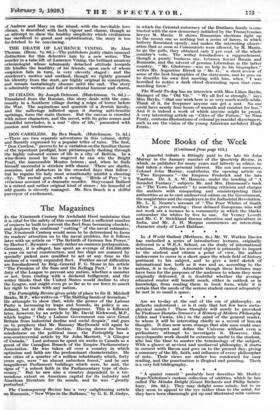The Magazines
IN the Nineteenth- Century Sir Archibald Hurd maintains that it is vital for the safety of this country that a sufficient number of cruisers be built to prevent the fleet ftom becoming obsolete, and deplores the continual "cutting" " of the naval estimates. The Nineteenth Century would seem to be determined to focus its readers' attention on to the naval problem, for it follows later with an article on " The Rebirth of German Sea Power," by Hector C. Bywater—surely rather an ominous juxtaposition. Germany, it is alleged, has spent an average of £10,500,000 a year on naval construction, and her ships are manned by specially picked men qualified to act at any time as the nucleus of a vastly expanded fleet. Further naval difficulties are foreshadowed by Brig.-General F. G. Stone in his article " The Freedom of the Seas and the Kellogg Pact." It is the duty of the League to prevent any nation, whether a member or not, from trading with a declared belligerent, and the writer thinks that the United States would decline to obey the League, and might even go so far as to use force to assert her right to trade with any nation.
The Fortnightly Review gives pride of place to Sir R. Mitchell Banks, M.P., who writes on "The Shifting Sands of Socialism." He attempts to show that, while the power of the Labour Party is increasing by leaps and bounds, its policy is un- defined, but at the same time dangerous. This is followed later, however, by an article by Mr. David Kirkwood, M.P., which begins " Only a Labour Government can save Great Britain from industrial decline and social despair," and goes on to prophesy that Mr. Ramsay MacDonald will again be Premier after the June election. Having shown its broad- mindedness on- the political issue, the Fortnightly has a non-controversial article by Sir John Marriott, " A Glimpse of Canada." Last autumn he spent six weeks in Canada as a guest of the Cana4ian Branch of the Empire Parliamentary Association. He was taken all over a country in which optimism and faith are the predominant characteristics. He saw cities of a quarter of a million inhabitants which, forty years ago, were " an almost unbroken forest," and he saw magnificent Parliament buildings which were, he said, the signs of " a robust faith in the Parliamentary type of dem- ocracy." But he saw also a country dependent to a tre- mendous extent on American capital for its industry and American literature for its minds, and he was " greatly perturbed."
The Contemporary Review has a very enlightening article on Rumania, "New Wine in the Balkans," by G. E. R. Gedye,
in which the Oriental autocracy of the Bratianu family- is con- trasted with the new democracyinitiated by the Transylvanian lawyer M. Maniu. It shows Rumanian elections right up to the recent one as nothing but a series of farces, in which bribery flourished openly, and makes the interesting observ- . ation_that as soon as Communists were allowed, by M. Maniu, _to go the pialls,!they , obtained only 2 per cent. of the whole __country% - vote. The :writer foreshadows a rapprochement, though a purely business- one, between Soviet Russia and -Rumania, and the advent-Or genuine Liberalism in the latter country. "Mr. Gladstone—was no help to his biographer," . writes Mr. Augustine Birrell -in ," Mr. G.," a short review of some of the hest biographies of the statesman, and he goes on - to describe his own first meeting with him, when I was horrified to notice a dark cloud descencling upon that com- manding— brow."
The World To-day-has an interview with -Miss Lilian Baylis, !Manager of the Old Vic." " We all feel so strongly," says --Mai Baylis, " that our'Work.here is so very much worth-while. -Think of - it, for fivepence anyone can get a seat. No one could have nearly four hours of warmth and conifort for less." And it is indeed a work of which anyone might be proud. !A -very interesting- article on " Cities cif. the Future, " by Nina Purdy, contains illustrations of colossal pyramidal skyscrapers, such as are the vision of the young Atherican architect Hugh








































 Previous page
Previous page